Bourke Ulick J. Easy lessons, or Self-instruction in Irish / Легкие уроки: самоучитель ирландского языка
Подождите немного. Документ загружается.

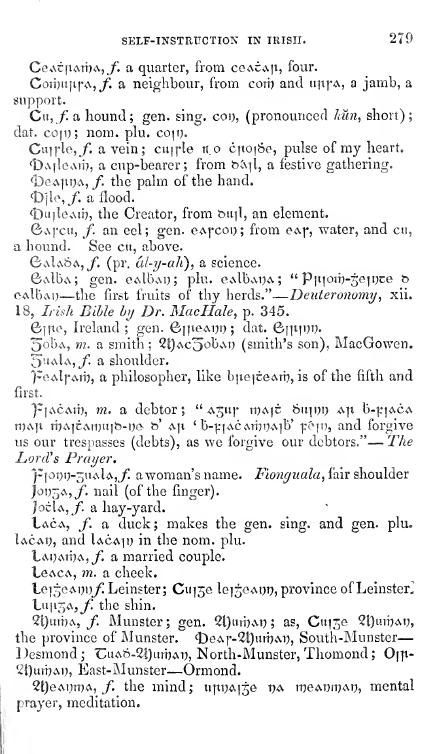
SELF-INSTRUCTION IN
IRISH.
279
Ce^.\t]\c^n)<\,
f.
a
quarter, from ceACA]!,
four.
CoiiniftfA,/".
a
neighbour, from
corb
and ii]tfA,
a
jamb,
a
support.
Cn,f.
a hound; gen.
sing, coi),
(pronounced
Jam,
short);
dat.
coil);
nora. plu. co|r).
Cuii-le,/.
a
vein;
ciiifle
no
c|toi8e,
pvdse
of ray
heart.
í)A|le<.\rÍ7,
a
cup-bearer
;
from
h(v]Í,
a
festive
gathering.
<t)eA|tr)A,
/.
the palm
of the
hand.
t)lle,/.
a
flood.
<t)iilleAtb,
the Creator,
from
hiql,
an
element.
6Af
cu,
f.
an
eel
;
gen.
eA|*coi)
;
from eA]*,
water, and cit,
a
hound.
See cii, above.
G/aUóAjjT. (pr. al-y-ali),
a science.
6Alb<v; gen. eAlb<vi);
plu. e^lbATjA;
"
p|t]oit)-5e]r)ce
&
eAlbAi)
—
the first fruits
of thy
herds."
—
Deuteronomy, xii.
18,
Irish
Bible by Dr.
MacHale,
p.
345.
Bute,
Ireland; gen.
6i|ieAT)r)
; dat.
Q:>WX]V\).
3ob<\,
m. a smith
;
2l)Ac3ohAi) (smith's
son), MacGowen.
^íiaIa,
/.
a
shoulder.
peAl|*AtÍ7,
a
philosopher,
like
bjieiceAri),
is of the
fifth
and
first.
pjACATT),
m,
a
debtor;
"
Ajuf
r\)^t
6iqi)T)
a|i
b-|iiACA
n)A|t
TT)<\icAtr)ui<3-i)e
fci'
A|i
'b-^*iACATT)i)Aib'
y:<y\\ii
and
forgive
us our
trespasses (debts),
as
we
forgive our
debtors."
—
The
Lord's Prayer.
'Pioi)i)-5uaIa,/.
a
woman's name.
Z^iow^waZa,
fair shoulder
joi)5A,/.
nail (of the finger).
)oi\^,f.
a hay-yard.
Laca,
/.
a
duck; makes the
gen.
sing,
and
gen.
plu.,
Iacat), and
Iacaii)
in the nom.
plu.
l,<vi)Ait)A,
f.
a
married couple.
LeACA, m.
a
cheek.
'Lei5eAi)i)y!
Leinster;
Cu]3e le]5eAi)r), province
of
Leinster^
\.\.\]\-r^^,
f.
the
shin.
2l)iin}<v, /.
Munster;
gen.
2t)urÍ7Ar)
;
as, Cu^je
2t)urbAr),
the
province
of
Munster.
í)eA|--2t)uTT)AT),
South-Munster
—
IJesmond; 'CuA6-2t)iiTT)AT),
North-Munster,
Thomond;
Oi|i-
2t)utTjAi), East-Munster
—Ormond.
2l)eAnn7A,
_/.
the
mind; u]ti)A)5e
t>A
Tt7eAt)inAr),
mental
prayer, meditation.
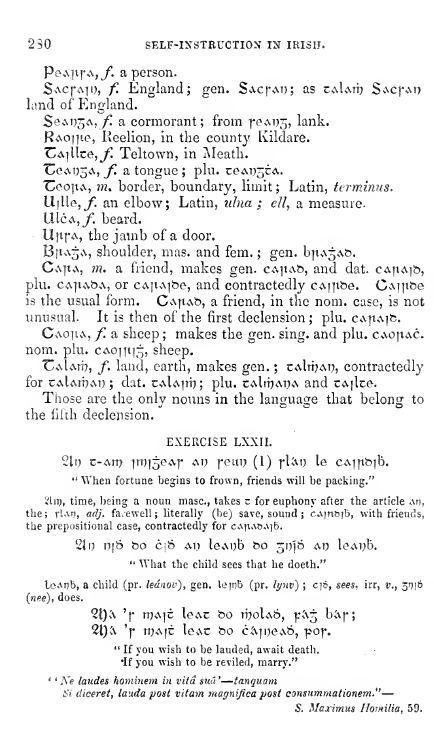
230 SELF-INSTRUCTIOX IN
IRISH.
Pei^]\]\\,f.
a
person.
Sac)*ati),
f.
England; gen.
SokCfAn;
as
caIatí)
S^cfAn
land of
England.
SeAT)5A,/!
a
cormorant; fpom
]*eAr)5,
lank.
RAonxe,
Reelion,
in the county
Kildare.
'C4>,]\\te,f.
Teltown, in Aleatli.
"CeAOSvA,
/^
a
tongue
;
plu. ceAT)5CA.
"CeoiiA,
m,
border,
boundary, limit
;
Latin,
terminus.
U|lle,/*.
an
elbow;
Latin, ulna
;
ell,
a
measure.
UlcA,/".
beard.
Ujti'A,
the jamb of
a
door.
BftAJA,
shoulder, mas.
and
fern.
;
gen. b|iA5A&.
Ca]ia,
7n.
a
friend,
makes
gen.
CA]tAb,
and dat.
CA|tAi&,
plu.
CAftA&A,
or
cAiiA]be, and contractedly
cAijibe.
CAHt&e
is
the
usual form.
CA]tAb,
a
friend, in the nom.
case, is not
unusual.
It is then of
the
first declension
;
plu. cA|iA]fc.
Cao]ia,
f.
a sheep
;
makes the gen.
sing, and plu. caoji.ac.
nom.
plu.
cAonti3,
sheep.
"CAlArb,
/.
land,
earth, makes gen.
; cAlrbAt),
contractedly
for caIatí^at); dat.
caIaití);
plu. cAlr^AijA and
CAilce.
Those
are the only
nouns
in
the language that belong to
the
fifth
declension.
EXERCISE LXXII.
2li) c-An)
-|rr)i5eA|-
au
feiuj
(1)
fUvi)
le
CA]ftb]b.
*'
When fortune
begins
to frown,
friends
will
be packing."
2ln),
time, being a
noun masc, takes
c
for
euphony after the article
ah,
the; rlAT), adj.
farewell; literally
(be)
save, sound ; cAjrtojb,
with
friends,
the prepositional
case,
contractedly for
cAtaA&Aib.
21
1)
i)i6
bo
C|6
Ai) leAi)b &o 5i)í8 at) IcAi^b.
"
What
the child sees that he doeth."
leAtjb, a child
(pr.
leánov),
gen. lejnb
(pr.
lynv)
;
c]ó, sees, irr,
v.,
5n|6
(nee),
does.
2t)<\
'f
n)ATC
leAc bo
rboÍAÓ,
^<\5 b<\f
;
2^iv
']•
TTjAic
leAC bo
ci\]i;eA6,
pof.
"
If you
wish
to be lauded, await death.
•If
you
wish to be reviled,
marry."
'
' Ae laudes
hominem in vita sua'
—
tanquam
Si diceret, lauda post
vitam
magnifica
post
consummationem."
—
S.
Maximus
Hoinilia,
59.
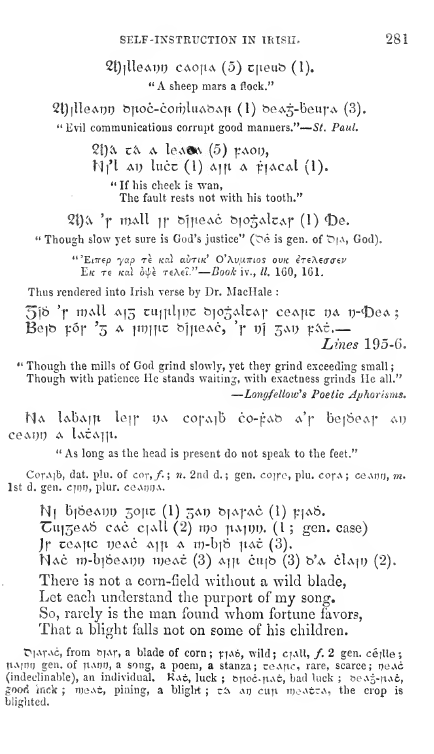
SELF-INSTRUCTION
IN IRISH-
281
2t)iUeAT;tj
cAO|tA
(5)
cpeub
(I),
"
A sheep mars
a
flock."
2t)illeAr)i?
b]toc-corT)litAhA|i
(1)
beA5-beu]-A
(3).
"
Evil
communications corrupt good manners."
—
St.
Paul.
2t)ic c4v A leA#iv
(5)/|íAou,
M]'l
A1)
luce
(1)
A]il
A
f]ACAl
(I).
"
If his cheek is wan,
The
fault rests not with his tooth."
iJt)Cv
Y
tTMnU
ir
bi|ieAC bjogAlcAf
(1)
í)e.
"
Though
slow yet
sure is God's
justice"
(pé
is
gen.
of
t»|A,
God).
"'Eíirep
yap
re koI avriK'
O'Kvfiirios ovk
ÍTeXeffffev
E/c
re Kol o^/e Te\ú."—Book iv.,
II.
160,
161.
Thus
rendered
into Irish verse by Dr.
MacHale
:
3íé
'f
"7^11
A15
cu||il]t}c bj05AlcA|*
ceAjic
t)A
r)-t)eA
;
Beib
for
'5
A
imiftc
bi]ieAC,
'f
\)]
5AT) pívé
—
Zrme^
195-6.
"
Though the
mills of God grind slowly,
yet
they
grind exceeding
small
;
Though
with patience He stands waiting, with
exactness grinds
He
all."
—
Longfellow's
Poetic Aphorisms.
Ma
lAbAi]t
le]f
t;A
co}*Aib
co-f*Ab
A'f
beióeA^
aij
CeAl}I) A
lACAl]t.
"
As
long as
the
head is present
do not speak to the feet."
CofAib,
dat.
plu.
of
cor,/.;
n. 2nd
d.
;
gen.
co]xc,
plu.
cofA;
ceAtjrj,
m,
1st d.
gen.
c]\)r),
plur,
ceA7)nv\.
M|
bjÓeAW
50|XC
(1)
5
At)
b]A|-AC
(1)
pjAÓ.
"CuiSeAS
CAC
ciaU
(2)
njo
|tA]i)r). (I
;
gen. case)
jl*
ceAjtc
i)eAC A]]i
A
rn-b|6
]iac
(3).
Mac
Tt)-b]6eAi)0
rr^eAC
(3)
A]]t
cu]b
(3)
b'A
cIa^o
(2).
There
is not
a corn-field
without
a
wild blade,
Let
each
understand
the
purport of
my
song.
So,
rarely is
the man
found
whom fortune favors,
That a blight falls
not
on
some of
his
children.
t>]ArAc,
from
bjAr,
a
blade
of corn;
^]Aó,
wild; c]aU,
/.
2
gen.
céjlle;
nAinn
gen.
of
tiahu,
a song,
a poem,
a
stanza;
ceAftc,
rare, scarce;
tjeAc
(indeclinable),
an
individual.
Kac,
luck
;
bnoc-rtAC,
bad
luck
;
&eA5-taA6,
good
lack
;
njeAt,
pining,
a
bliglrt
;
cl\
ao
cutt
n;eAtrA,
the
crop
is
blighted.
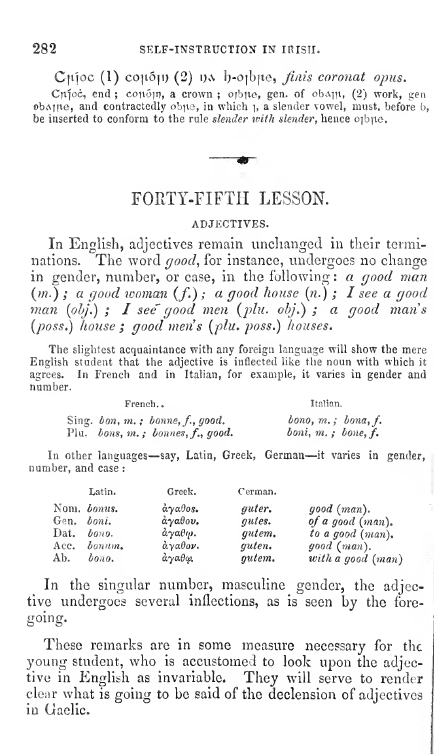
282
SELF-INSTRUCTION IN IRISH.
C|i]oc
(1)
co|ió|i)
(2)
i)v\
b-oibfte,
finis
coronat
opus.
C|ifoc,
end
;
conóm,
a
crown
;
oibtie,
gen. of obAni,
(2)
work,
gen
obAitte,
and contractedly
obtxt>, in
which
],
a
slender vowel, must,
before b,
be inserted to conform
to the rule
slender
ivith slender, hence
ojbtie.
FORTY-FIFTH LESSON.
ADJECTIVES.
In English, adjectives
remain unclianged in their
termi-
nations. The word ^ood,
for instance, undergoes
no
change
in
gender, number,
or
case,
in the
following
: a
good
man
{rn.)
;
a good
looman
(/.)
;
a good
house
[n.)
;
I see
a
good
man
{ohj.)
;
/ see' good men
{phi. obj.)
;
a
good man's
(poss.) house
;
good mens
{plu. poss.)
houses.
The slightest acquaintance with any
foreign language will
show the
mere
English student
that the adjective is
inflected
like
the noun with which
it
agrees.
In French
and
in Italian,
for example, it varies
in gender
and
number.
French.,
Italian.
Sing. bon,m.; bonne,
f.,
good.
bono, m.
;
bona,f.
Plu. bons,m.;
bonnes,
f.,
good.
boni, m.
;
bone,/.
In other languages—
say,
Latin,
Greek, German—it varies
in
gender,
number,
and case :
i
Nom
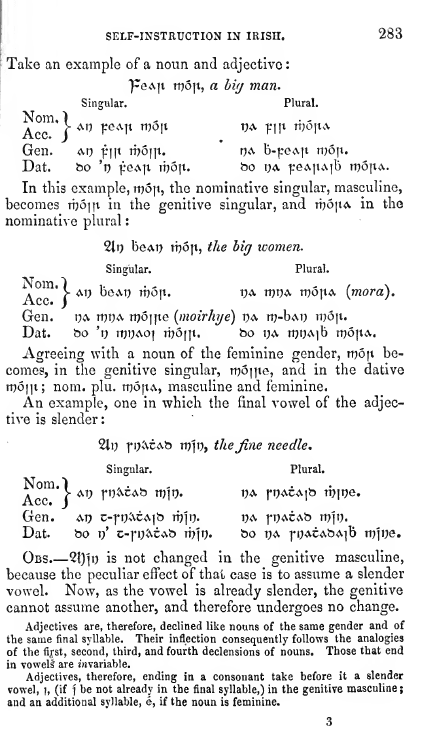
SELF-INSTRUCTION IN IRISH.
283
Take an example of
a
noun and adjective
:
peAji n)ó]x,
a
birj
man.
Singular.
Plural.
Nom,
)
Acc.
J
^'^
^^^^
'^'^^^
^^
^"^
"^*^'^^
Gen.
At)
f:i]t
rbó||i.
t?A
b-peAji rr>ó|t.
Dat.
bo 'rj pevAjt TÍ7Ó]t.
bo i)<v
^eAjtAjb
n^óitA.
In
tills
example, rnoji, the
nominative
singular,
masculine,
becomes
n)ó||i in
the genitive singular,
and
rijóit^
in
the
nominative
plural
:
2lr)
beAt)
rboji,
the big women.
Singular. Plural.
.
'
>
At) beAt)
tT)5|i.
i)A
rr)t)A
n)5]tA
(mora).
Gen.
r)A
rtjtJA
rf)ó||te (jnoirhye) r)A nj-bAr)
n^ofi.
Dat.
bo
't)
rt)i)AO]
rbó[|i.
bo t;A
Ti7r)Aib
rtjojiA.
Agreeing with
a
noun of the feminine
gender,
rr)ó|t
be-
comes, in the genitive singular, tt7Ó|jie, and in
the dative
xx)ó\\x
;
nom. plu.
n^oftA,
masculine and feminine.
An example, one in which the final vowel of
the adjec-
tive
is
slender
:
2li)
f
i)i\CAb Tt)]!),
the
fine
needle.
Singular. Plural.
A
*
j-
^í)
]*i)^cAb
x\)\x).
i)A
frjACAjb
TÍ)|t)e.
Gen.
At)
c-ft)i\cAib
vri\x). r)A
ftjACAb
tt)]!).
Dat.
bo T)'
c-i-tji^CAb ti^ir).
bo tjA ]*t)ACAbAib
rtjítje,
Obs.
—
2t)ii)
is not
changed in
the
genitive
masculine,
because
the peculiar effect
of that
case is to
assume a
slender
vowel.
Now,
as the
vowel is
already
slender,
the
genitive
cannot
assume another,
and
therefore undergoes
no
change.
Adjectives
are, therefore,
declined
like
nouns of
the same
gender
and of
the
same
final
syllable. Their inflection
consequently follows
the
analogies
of
the
fifst,
second,
third,
and
fourth
declensions
of
nouns.
Those
that end
in
vowelá
are
invariable.
Adjectives,
therefore,
ending
in
a
consonant take
before it
a
slender
vowel,
1,
(if
t
be
not
already in
the final syllable,)
in the
genitive
masculine
;
and an
additional
syllable,
é,
if
the
noun is
feminine.
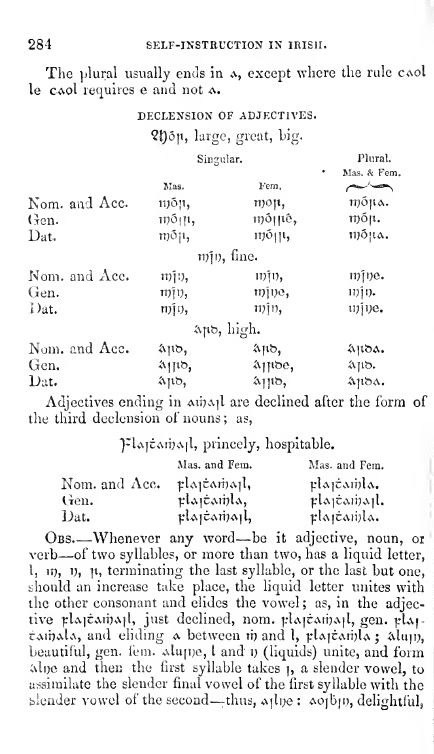
284
SELF-INSTRUCTION IN IRISH.
The
]jlural usually ends
in
a, except
where
the
rule c<\o\
le CAol
rec^uiies e and
not
a.
DECLENSION
OF
ADJECTIVES.
9t)ó|t,
large, great,
big.
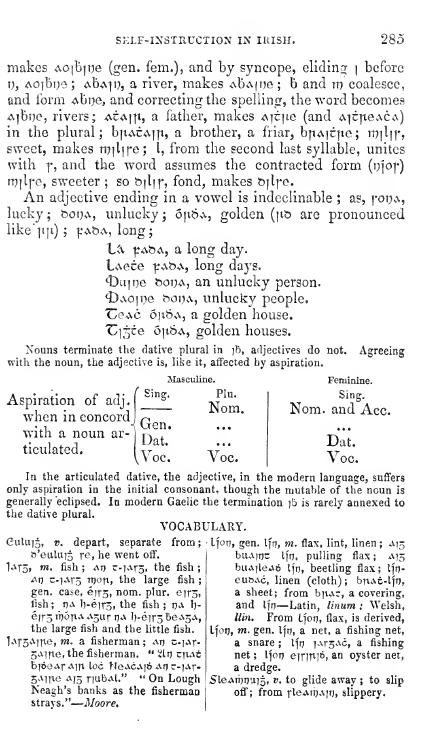
SKLF-IXSTRUCTION IN HUSH. 285
makes
AOjbiDe
(gen. fem.), and
bj
syncope, eliding
]
before
i;,
Aoibi)e;
AbAn;,
a
river, makes
AbA(ne; b and
ny
coalesce,
and
form Abi^e, and
correcting the spelling, the
word becomes
A]br)e,
rivers; ACA]|t,
a
father, makes A]C]ie
(and
AiciteACA)
in
the
plural;
b|tACAi|i, a
brother,
a
friar,
b]iAic|te;
rn]l]Yt
sweet, makes
njiljf-e;
I, from the second last
syllable,
unites
with
-[•,
and
the word assumes the contracted
form
(i)io]*)
rT)]l]'e,
sweeter
;
so
bilii*,
fond,
makes
&]lfe.
An adjective
ending in
a
vowel is indeclinable
;
as,
|*oija,
lucky
;
botjA,
unlucky
-,
óftÓA,
golden
(jtb
are
pronounced
like
]i[i)
;
f.*A&A,
long;
Liv -pAbA, a
long
day.
ÍAece
-pAbA,
long
days.
i)ix]r)e boi)A, an unlucky
person.
*t)AoiT)e
boi)A,
unlucky
people.
'CeAC
óítÓA,
a golden house.
'C]5ce 6|i6a,
golden
houses.
Nouns
terminate
the dative
plural in ]b,
adjectives
do not.
Agreeing
with the noun, the
adjective is, like it, aflfected
by
aspiration.
Masciiline.
Feminine.
Aspiration of adj.
when
in concord
with
a
noun ar-
ticulated.
Smg,
Gen.
Dat.
Voc.
PIu.
Nom.
Voc.
Sing.
Nom.
and
Ace.
Dat.
Voc.
In the articulated dative,
the
adjective,
in
the
modern
language,
suffers
only aspiration
in the
initial
consonant, though
the mutable
of
the noun
is
generally
eclipsed.
In
modern Gaelic the
termination
jb
is
rarely annexed
to
the
dative plural.
VOCABULARY.
Guluio,
V. depart,
separate
from
;
ti'euUM5
re,
he
went oif.
lAfs,
m. fish
;
ad
r-iArs,
the fish
;
At)
c-iAr5
Too|x,
the
large fish
;
gen. case,
ejrs,
nom.
plur.
eirs,
fish;
HA
h-é)r5,
the
fish; tja
l)-
é|r5
n)ÓTiA
A5ur tia
Ij-éirs
BeASA,
the large fish
and
the little fish.
lAf5A]tie,
m. a
fisherman
;
at)
c-jat-
SAifte,
the
fisherman.
"
y.i)
z]u\t
b]óeArAin
loc
Nev\CAió
at)
r-^Ar-
SAii^e
a;5
nubAl."
"
On
Lough
Neagh's
banks
as
the
fisherman
strays."
—
Moore.
IfoT), gen.
Ifr),
m. flax,
lint,
linen ; A15
buAiT)c
IfT),
pulling flax; A]5
buAjleAB
Ifn,
beetling flax;
IfT)-
eu&Ac,
linen
(cloth);
briAc-lfu,
a sheet;
from bjiAr, a covering,
and
Ifn—
Latin, linum
;
Welsh,
llin.
From
LfoT),
flax,
is derived,
IfoT),
m. gen.
Ifr),
a
net,
a
fishing net,
a
snare
;
Ifr)
]Ar3Ac, a fishing
net
; Ifon
ejriTiló,
an oyster
net,
a
dredge.
5leAiT)T)ui5, V. to glide away
;
to
slip
ofl"; from
tleA^'ipAjt), slippery.
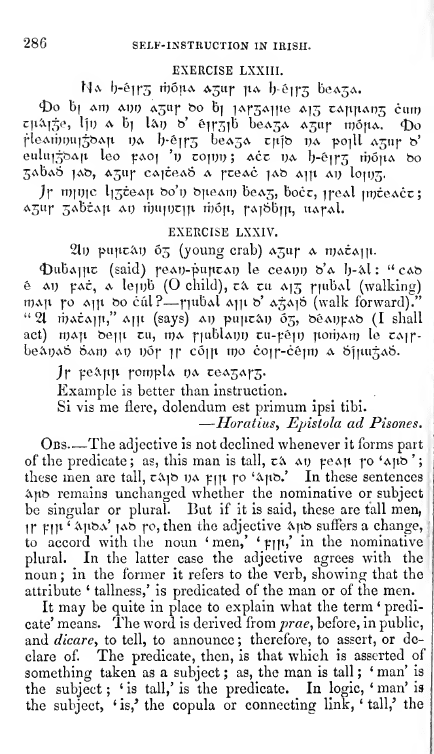
286
SELF-INSTRUCTION
IN
IRISH.
EXERCISE
LXXIII.
Nv\
b-éirS
ri^oiiA
A5Uf
]t<v
b-éirs
beA5A.
C)o
bi
Alt) ATjtj
Ajuf
bo
b]
]Af5Aiite
A15 CA|a|XAn5
cixtr»
cji^jje,
lit;
A b|
lixt)
&'
^]y^]h beA5A
A5uf
TT)ó}tA.
<t)o
fleAtr)i)U|5bA]t
r)A
b-^irS
beA5A
cfiib
t)a
po^ll
A-^uy b'
eului5bA|t leo
^ao]
'i;
cojud
;
acc
i)a
b-^irS
Tbó|tA
bo
5AbA6
]Ab,
A5uf
cAjceAO
a
fceAC
]Ab
A]|t
ai)
lo]i)5.
jf
rnjtjic li5ceA|i
bo't) bjieAn?
beA^,
bocc,
]ye^l
irrjceACc;
^5"r
5AbcA]t Ai;
tbuiuqjt
mójt,
fAi6b||t,
uaj^aI.
EXERCISE
LXXIV.
2lu
pu|icivi)
Ó5
(young
crab) A5U|*
a
njACAHi.
í)ubA]]ac (said)
í*eAi)-puiicAt) le ceAr)r)
b'A
b-^l
:
"
cAb
é
Ai)
pAC, A
le|t;b (O child),
c^ cii
Ai5
ffubAl
(walking)
tDAfi
]-o
AT|i
bo
cid?
—
|*iubAl
A]]t b'
A5A]6 (walk
forward)."
"
21 Tt)ACA]ii,"
Afji
(says)
aij pujicivi)
Ó5,
béAupAb
(I
shall
act) rt)A|i
beijx
cu,
n^A
]-)ublAUi)
cii-féjo
|tori}An7
le
cai|*-
beivi;A6
óah)
At) i;ó|*
]}•
cónt
ti^o
co|f-cé]n)
a
6íftu5A6.
)y
feixpit
fon^plA
i)A
ceA5Af5.
Example is better than instruction.
Si vis
me Here,
dolendum est primum ipsi tibi.
—
HoratiuSf Epistola ad Pisones.
Obs
—The adjective is not
declined
whenever it
forms part
of the predicate; as,
this man is tall, cC\ ai)
|:eAit
yo
'A]tb';
these men are
tall,
c;\]b i;a
fijt
|-o
'ivfxb.'
In these
sentences
i^)tb
remains unchanged
whether the nominative or subject
be
singular
or
plural. But if it is said, these are
tall men,
]|*
p]|i ' ivjibA*
iAb
fo,
then
the adjective
^|tb
suffers
a
change,
to accord
with the noun
'men,'
'f]ft,'
in the nominative
plural.
In
the latter case
the adjective agrees
with
the
noun ;
in the former
it
refers to
the verb, showing that
the
attribute
'
tallness,' is predicated
of
the man or of the men.
It
may
be
quite
in
place
to
explain what the term
'
predi-
cate'
means. The
word
is derived
from prae, before, in
public,
and
dicare, to tell,
to
announce ;
therefore,
to
assert, or de-
clare
of
The
predicate,
then, is
that
which
is asserted
of
something taken as
a subject
; as,
the man is
tall
;
'
man'
is
the
subject
;
'
is
tall,'
is the predicate. In
logic,
'
man'
ig
the subject,
'
is,^
the
copula
or connecting
link,
'
tall,'
the
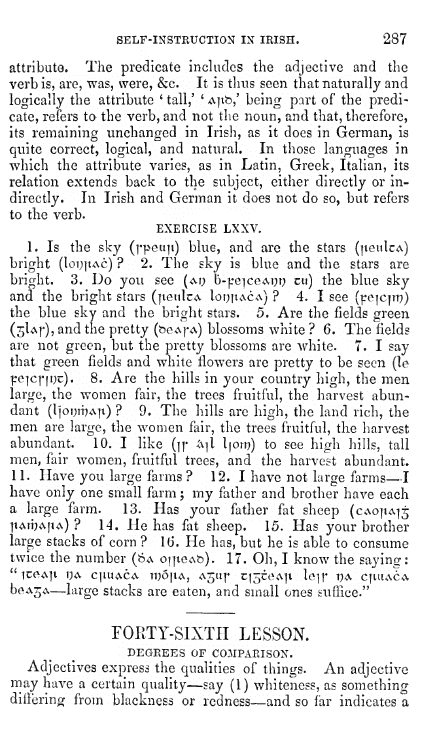
SELF-INSTBUCTION IN lEISH.
287
attributG.
The predicate
includes
the adjective and
the
verb is,
are,
was, were, &c.
It is thus seen
that naturally and
logically the
attribute
'
tall,'
'
a|i&,' being
part of the predi-
cate,
refers
ta
the verb,
and not
the
noun, and
that,
therefore,
its
remaining
unchanged in Irish, as
it
does
in German, is
quite correct,
logical, and natural. In those
languages
in
which the attribute
varies,
as
in Latin,
Greek, Italian,
its
relation extends back to the subject, either directly or in-
directly. In Irish and German it
does
not
do so, but
refers
to the
verb.
EXERCISE LXXV.
1.
Is
the sky
(|*peu]i)
blue,
and
are
the stars
(ftculcA)
bright
(loi;}iAc)
?
2. The sky
is blue
and
the
stars are
bright. 3. Do
you see
(ai?
b-fieiceATjT)
cii) the
blue sky
and the
bright
stars
(fieulcA lot)it<\cA) ?
4.
I
see
(pe|C]tD)
the
blue
sky
and the bright stars.
5. Are
the
fields
green
(sUf),
and the pretty
(beAf
a) blossoms
white
? 6. The fields
are not
green,
but the
pretty
blossoms
are white.
7. I
say
that green fields and white flowers
are pretty
to be
seen
(le
•pe]ci'|uc).
8. Are the hills
in
your country high,
the
men
large,
the women
fair, the
trees fruitful,
the harvest
abun-
dant
(liourijAlt) ? 9.
The hills
are high,
the land
rich,
the
men are
large,
the
women fair,
the trees fruitful,
the
harvest
abundant.
10.
I
like
{]y
^]l
l|orr))
to
see
high hills,
tall
men,
fair
women,
fruitful
trees, and
the harvest
abundant.
11. Have
you large
farms
? 12.
I have not large
farms
—
I
have
only
one small
farm
;
my
father
and brother
have
each
a
large
farm.
13.
Has
your
father fat sheep
(cao|ia]5
ItATTjAiiA) ? 14.
He has
fat sheep. 15.
Has
your
brother
large
stacks
of
corn
? 16. He
has,
but he is able
to
consume
twice
the
number
(6a
onte<Nb). 17.
Oh,
I
know
the
saying:
"
1ceA|i
t)A
citUACA n)ópA,
ASHi*
ci5i:eAii
le]r
i:)A
ciiuaca
beA3A
—
large
stacks
are eaten, and
small
ones
suffice."
FOETY-SIXTH
LESSON.
DEGEEES
OF
COMPAEISON.
Adjectives
express
the
qualities
of things.
An
adjective
rnay
have
a certain
quality
—say
(1)
whiteness,
as
something
differing
from
blackness
or
redness
—
and so
far
indicates
a
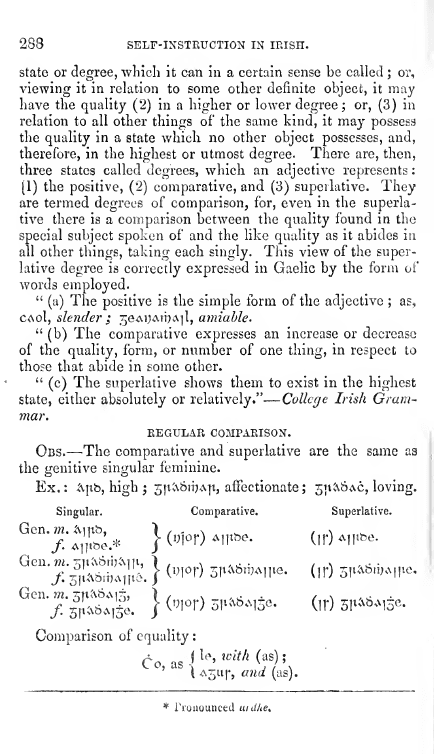
288 SELF-INSTRUCTION
IN IRISH.
State
or degree, which it can in
a
certain sense be
called
;
or,
viewing
it in relation
to
some other
definite object,
it
may
have the
quality
(2)
in
a
higher or
lower degree; or,
(3)
in
relation to all other
things
of
the
same
kind,
it
may
possess
the quality in
a
state
which no
other object possesses, and,
therefore,
in
the
highest or
utmost degree. There
are,
then,
three
states
called
degrees,
which an
adjective represents
:
(1)
the positive,
(2)
comparative, and
(3)
superlative. They
are termed
degrees of comparison, for, even
in
the
superla-
tive there is
a
comparison between the
quality found in the
special subject spoken of
and
the
like quality as it abides in
all other things, taking each singly. This
view
of the
super-
lative degree is
correctly expressed in Gaelic
by
the
form of
words employed.
"
(a) The
positive
is the simple form
of
the
adjective
; as,
CAol, slender
;
5eAi;AmA]l,
amiable.
"
(b)
The comparative expresses an
increase or decrease
of the quality,
form, or number
of one
thing,
in
respect to
those
that abide in
some other.
"
(c)
The
superlative
shows
them
to
exist in the
highest
state, either absolutely
or relatively."
—
College
Irish
Gram-
mar.
REGULAR COMPARISON.
Obs.
—The
comparative and superlative are the same
as
the
genitive
singular
feminine.
Ex.
: ivjib, high
j
5|t^6rbA|t, affectionate
;
3itC\ÓAC, loving.
Singular.
Comparative.
Superlative.
''""7-Te,*
}w°rt^„.-.
(,r)
^'^^'fl^l'A^'\!l]]xL
}
^'^'"^^^
5^^\^i^Aiite.
(ir)
3!»i^^"N^ine,
Comparison
of
equality
:
Co
as
i
^'''
'"'^'^
^^^)
'
*
i'loiiounced uid/te.
ipbe.
